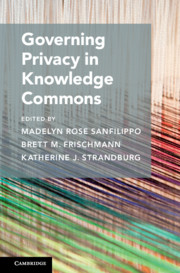Governing Privacy in Knowledge Commons
Governing Privacy in Knowledge Commons explores how privacy impacts knowledge production, community formation, and collaborative governance in diverse contexts, ranging from academia and IoT, to social media and mental health. Using nine new case studies and a meta-analysis of previous knowledge commons literature, the book integrates the Governing Knowledge Commons framework with Helen Nissenbaum’s Contextual Integrity framework. The multidisciplinary case studies show that personal information is often a key component of the resources created by knowledge commons. Moreover, even when it is not the focus of the commons, personal information governance may require community participation and boundaries. Taken together, the chapters illustrate the importance of exit and voice in constructing and sustaining knowledge commons through appropriate personal information flows. They also shed light on the shortcomings of current notice-and-consent style regulation of social media platforms. This title is also available as Open Access on Cambridge Core.
Madelyn Rose Sanfilippo is Assistant Professor at the School of Information Sciences, University of Illinois at Urbana-Champaign. She studies sociotechnical governance, broadly exploring privacy, inequality, and political consequences of information technology. She is the co-author of three previous books: Online Trolling and Its Perpetrators: Under the Cyberbridge (2016); Social Informatics Evolving (2015); and Multiculturalism and Information and Communication Technology (2013).
Brett M. Frischmann is the Charles Widger Endowed University Professor in Law, Business and Economics, at Villanova University. He is also an affiliated scholar of the Center for Internet and Society at Stanford Law School and a trustee for the Nexa Center for Internet and Society, Politecnico di Torino. Specializing in intellectual property and Internet law, he is the co-author of Re-Engineering Humanity with Evan Selinger (2018). He has also published foundational books on the relationships among infrastructural resources, governance, commons, and spillovers, including Governing Medical Knowledge Commons, with Michael Madison and Katherine Strandburg (2017); Governing Knowledge Commons, with Michael Madison and Katherine Strandburg (2014); and Infrastructure: The Social Value of Shared Resources (2012).
Katherine J. Strandburg is the Albert Engelberg Professor of Law at New York University School of Law. She directs NYU’s Information Law Institute and interdisciplinary Privacy Research Group and is a faculty director of the Engelberg Center on Innovation Law and Policy. Professor Strandburg co-developed the Governing Knowledge Commons framework and researches information privacy, automated decision-making, patents, and innovation policy. Before obtaining her JD, she was a computational physicist at Argonne National Laboratory.

